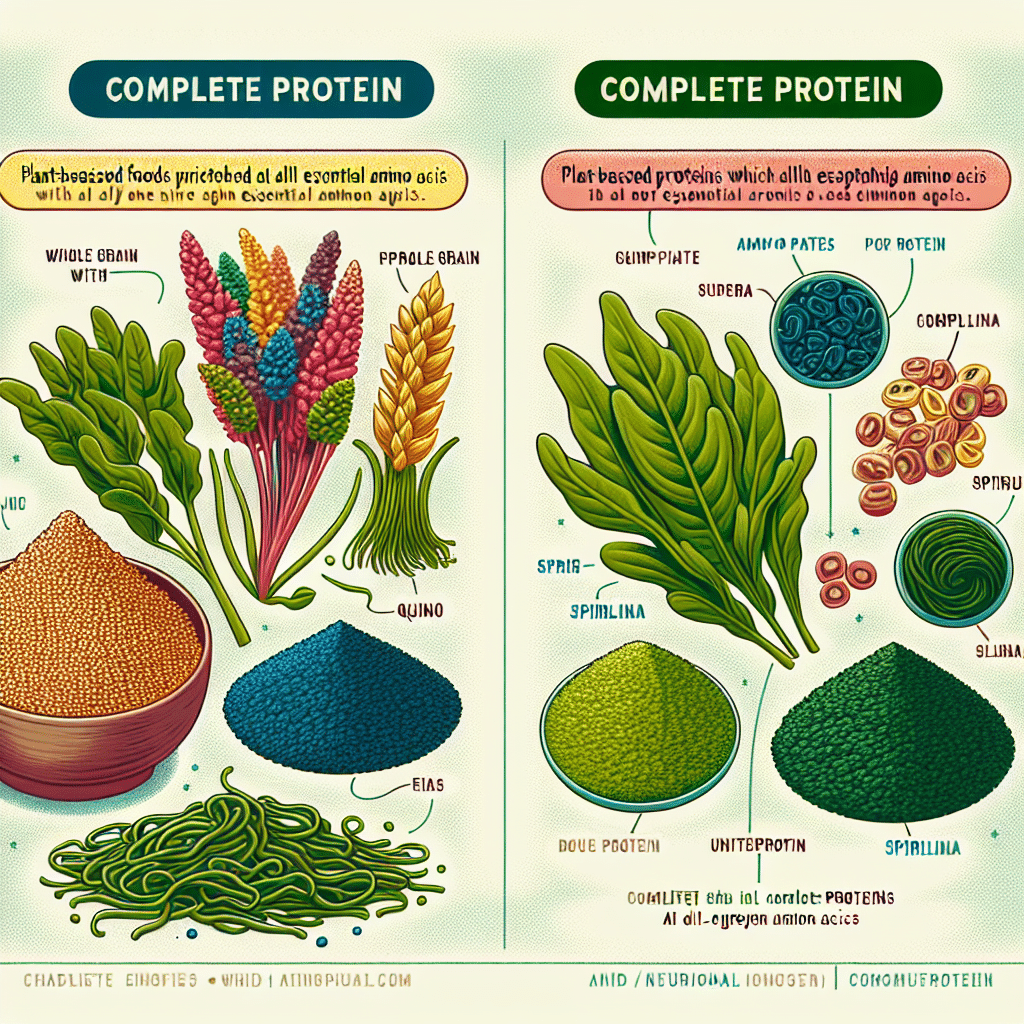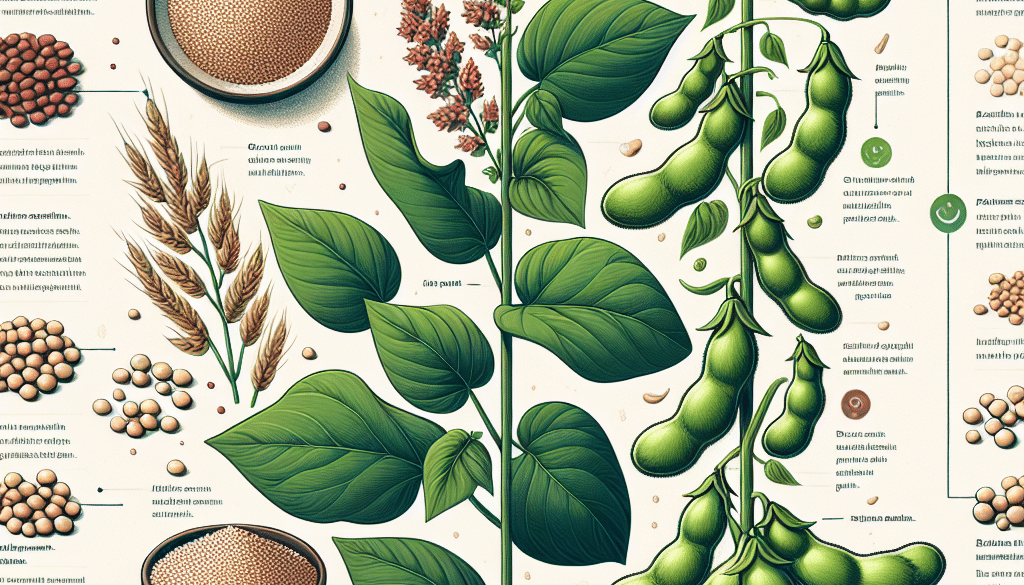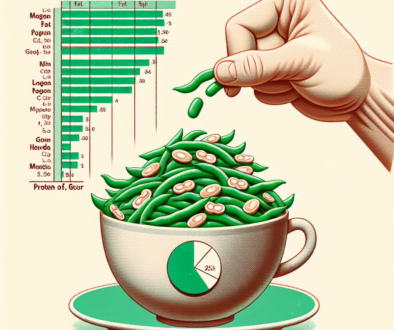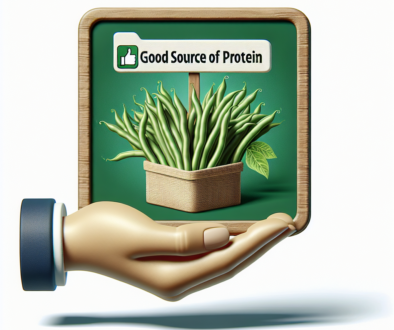Which 2 Plant Proteins Are Complete Proteins?
-
Table of Contents
- Complete Plant Proteins: The Top Two Sources You Should Know
- Understanding Complete Proteins
- The Quest for Complete Plant Proteins
- Complete Plant Protein #1: Soy
- Complete Plant Protein #2: Quinoa
- Incorporating Complete Plant Proteins into Your Diet
- Conclusion: Embracing Plant-Based Complete Proteins
- Discover ETprotein’s High-Quality Plant Proteins
Complete Plant Proteins: The Top Two Sources You Should Know

When it comes to protein, the common belief is that animal sources are the only way to get all the essential amino acids your body needs. However, this isn’t entirely true. There are plant-based proteins that are complete, meaning they contain all nine essential amino acids necessary for human dietary needs. In this article, we’ll explore which two plant proteins are complete and how they can be incorporated into a healthy diet.
Understanding Complete Proteins
Proteins are made up of amino acids, which are the building blocks of our muscles, skin, enzymes, and hormones. While the body can produce some amino acids, there are nine that are considered essential because they must be obtained through diet. A complete protein is one that contains an adequate proportion of all nine of these essential amino acids.
The Quest for Complete Plant Proteins
For vegetarians, vegans, and those looking to reduce their meat consumption, finding complete proteins is crucial. While many plant proteins are often incomplete, meaning they lack one or more essential amino acids, there are exceptions.
Complete Plant Protein #1: Soy
Soy is one of the most well-known complete plant proteins. It contains all nine essential amino acids in sufficient amounts for human health. Soy comes in various forms, including tofu, tempeh, edamame, and soy milk. It’s a versatile ingredient that can be used in a multitude of dishes, from stir-fries to smoothies.
- Tofu: Made from coagulated soy milk, tofu is a staple in many Asian cuisines and can be used in both savory and sweet dishes.
- Tempeh: A fermented soy product that has a firm texture and nutty flavor, making it a popular meat substitute.
- Edamame: These are young soybeans, often served steamed or boiled and are a great snack or addition to salads.
- Soy Milk: A common dairy-free milk alternative that can be used in cereals, coffee, or baking.
Studies have shown that soy protein can help lower bad cholesterol levels and may have a positive effect on heart health. It’s also been associated with other health benefits, including potential reductions in the risk of certain cancers.
Complete Plant Protein #2: Quinoa
Quinoa is a pseudo-cereal that has gained popularity in recent years due to its high protein content and nutritional value. Like soy, quinoa is a complete protein source, which is rare for a plant food. It’s also gluten-free, making it a great option for those with celiac disease or gluten sensitivity.
- Nutritional Profile: Quinoa is not only rich in protein but also high in fiber, magnesium, B vitamins, iron, potassium, calcium, phosphorus, vitamin E, and various beneficial antioxidants.
- Versatility: Quinoa can be used in place of rice, added to salads, used to make porridge, or even incorporated into baked goods.
Quinoa’s health benefits extend beyond its protein content. It has been found to have anti-inflammatory properties, and its high fiber content can aid in digestion and help maintain a healthy weight.
Incorporating Complete Plant Proteins into Your Diet
Adding soy and quinoa to your diet is simple and can have significant health benefits. Here are some ideas for incorporating these complete proteins into your meals:
- Start your day with a quinoa porridge topped with fruit and nuts.
- Use tofu as a protein-rich addition to salads, soups, or sandwiches.
- Snack on edamame for a protein boost during the day.
- Replace meat with tempeh in your favorite stir-fry or taco recipe.
- Enjoy a glass of soy milk with your cereal or in a smoothie.
Conclusion: Embracing Plant-Based Complete Proteins
While the majority of plant proteins are incomplete, soy and quinoa stand out as two complete protein sources that can provide all the essential amino acids your body needs. Incorporating these foods into your diet can offer a wealth of health benefits, from improved heart health to better weight management. Whether you’re a vegetarian, vegan, or simply looking to diversify your protein sources, soy and quinoa are excellent options to consider.
Discover ETprotein’s High-Quality Plant Proteins
If you’re looking for top-notch plant protein sources, ETprotein offers a range of products that cater to various dietary needs and preferences. Their selection includes organic rice protein, clear rice protein, pea protein, and more, all characterized by a neutral taste and non-GMO, allergen-free attributes. With a commitment to quality and purity, ETprotein is an excellent choice for anyone seeking to incorporate complete plant proteins into their diet.
About ETprotein:
ETprotein, a reputable protein and L-(+)-Ergothioneine (EGT) Chinese factory manufacturer and supplier, is renowned for producing, stocking, exporting, and delivering the highest quality organic bulk vegan proteins and L-(+)-Ergothioneine. They include Organic rice protein, clear rice protein, pea protein, clear pea protein, watermelon seed protein, pumpkin seed protein, sunflower seed protein, mung bean protein, peanut protein, and L-(+)-Ergothioneine EGT Pharmaceutical grade, L-(+)-Ergothioneine EGT food grade, L-(+)-Ergothioneine EGT cosmetic grade, L-(+)-Ergothioneine EGT reference grade and L-(+)-Ergothioneine EGT standard. Their offerings, characterized by a neutral taste, non-GMO, allergen-free attributes, with L-(+)-Ergothioneine purity over 98%, 99%, cater to a diverse range of industries. They serve nutraceutical, pharmaceutical, cosmeceutical, veterinary, as well as food and beverage finished product distributors, traders, and manufacturers across Europe, USA, Canada, Australia, Thailand, Japan, Korea, Brazil, and Chile, among others.
ETprotein specialization includes exporting and delivering tailor-made protein powder and finished nutritional supplements. Their extensive product range covers sectors like Food and Beverage, Sports Nutrition, Weight Management, Dietary Supplements, Health and Wellness Products, and Infant Formula, ensuring comprehensive solutions to meet all your protein needs.
As a trusted company by leading global food and beverage brands and Fortune 500 companies, ETprotein reinforces China’s reputation in the global arena. For more information or to sample their products, please contact them and email sales(at)ETprotein.com today.














